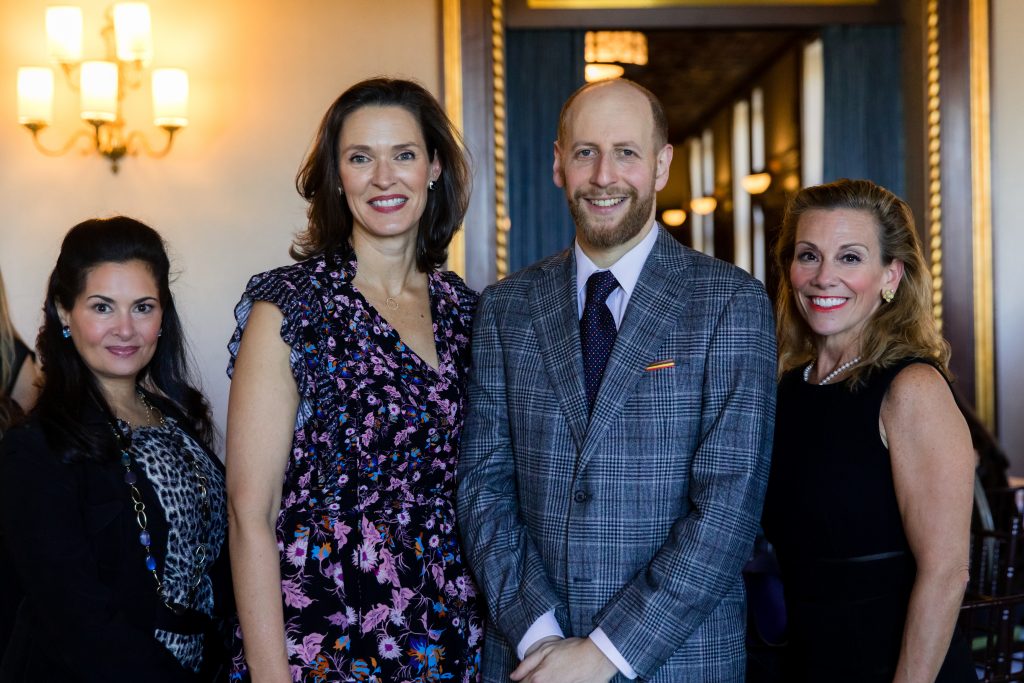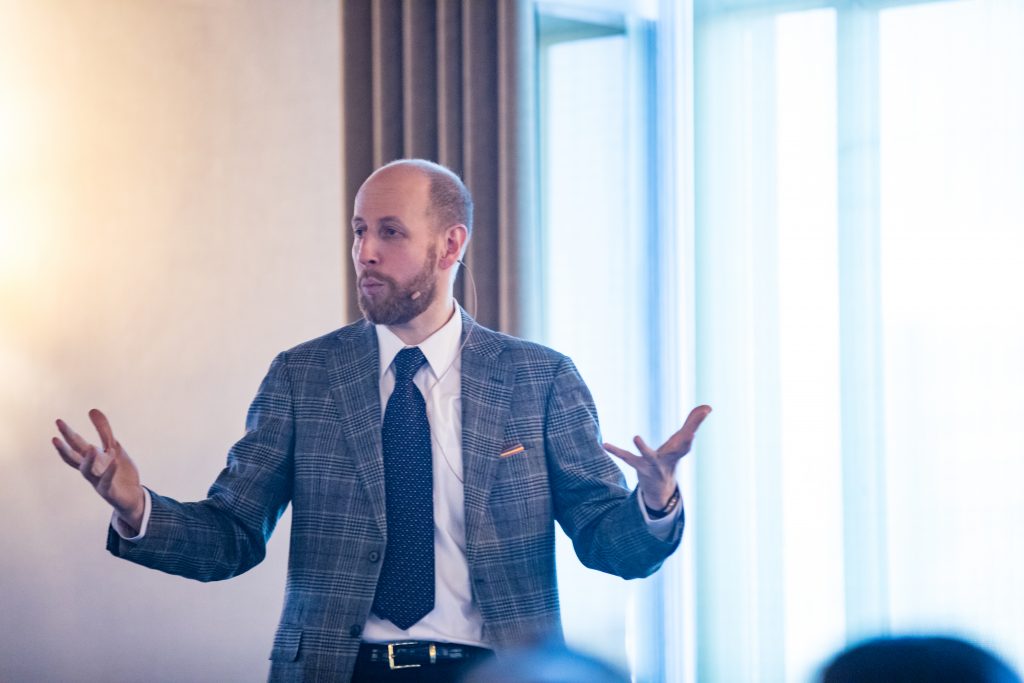By Pamela Awad
On a recent Wednesday at The New York Athletic Club in a dining room with iconic views of Central Park, author, professor and child psychiatrist Alan Schlechter stood before an assembled group of PIA supporters talking about happiness. Dr. Schlechter teaches a wildly popular course at NYU called “The Science of Happiness.” This particular afternoon, at PIA’s annual benefit luncheon, Dr. Schlechter explained how happiness, a “positive emotion,” is really just one of combination of conditions that contribute to the more intriguing feeling of well-being.
Bearded and in his words, “no longer curly haired,” Dr. Schlechter defines well-being by the acronym PERMA – positive emotions, engagements, relationships, meaning and accomplishment – the elements he believes contribute to well-being. “Negative emotions are valuable,” he said, “we need sadness, fear disgust, anxiety, to survive. Negative emotions cause action tendencies… they tell us to reach out for help, [that] we need support and physical contact from other people.” In contrast, positive emotions, “rather than telling us to do something, make us think. Our positive emotions serve as a compass for us, they tell us what we should do if we’re good enough to listen to them.” He explained that emotions “can be activated or inactivated.” We can buy activated positive emotions like happiness, excitement, joy and enthusiasm by seeing a movie, going to a concert or having a great meal. Inactivated positive emotions like calmness, tranquility and serenity are harder to purchase and more challenging to develop.
Dr. Schlechter noted that most of us would agree if we were Beyonce, we’d be happy. “We’ve been taught that success brings happiness,” he said, “but most studies of the evidence go the other way.” The audience was asked to close their eyes for fifteen seconds and think of their happiest moments. This is called priming; positive emotions do something specific to the brain and studies show “those primed with positive emotions have been shown to be more effective, make more money, be more successful in their work, have better relationships and higher levels of well being,” he said. When primed with positive thoughts, adolescents answer more SAT questions correctly, memorize more foreign words faster and get along better with others. It seems success doesn’t bring happiness, happiness brings success.
If you’d like to have some fun go to viacharacter.org and take the survey that helps you identify your character strengths (it’s free). Character strengths are the positive parts of your personality that impact how you think, feel and engage with others. They include creativity, curiosity, humor and social intelligence. Physical activity that’s challenging and activities that engage our character strengths are fulfilling, invigorating and high in flow.
“Engagement, flow, being in the zone, being totally absorbed in the process and losing track of time” is the ‘E’ in PERMA said Dr. Schlechter. Activities that are flow-like, such as video gaming and binge watching TV, are absorbing but “they’re junk flow, when they’re over you don’t feel invigorated, you feel apathetic.” Engagement contributes to higher levels of well-being; the better we feel about ourselves the more likely we are to meaningfully engage and the less likely we are to feel emotionally overwhelmed. And according to Dr. Schlechter, “the number one predictor of child happiness isn’t the character strengths of a child but the parent’s emotional regulation.”
Relationships are a great indicator of happiness and “our most highly correlated quality with our well being; nothing is bigger. If you do not have someone to share your joy with it’s actually less enjoyable,” said Dr. Schlechter. As well as sharing good moments, friends can alter one’s perception of pain. “If you are forced to dip your hand into a bucket of ice and you are holding a friend’s hand you report 25% less pain,” he said. For adolescents, peer relationships take on heightened significance and when “kids feel they are being separated from their peers they feel it as a physical pain and that is something [parents] need to acknowledge.”
Remember when your mother said, “Don’t hang out with that kid, he’s no good?” According to Dr. Schlechter, Mom was right and he cited studies about the influence of friends on happiness. “If your friend is known to have positive emotions you’re 15% more likely to have positive emotions; 15% is the difference between an A and C plus; in the medical world it’s a lot.” Conversely, if your friend is depressed, you’re more likely to be depressed. Sometimes a friendship stops being a positive resource and Dr. Schlechter advised parents, “if your child has a friend that makes them feel bad, it’s time to take a break.” That goes for grown ups too.
“Meaning is what matters to us, it’s what makes sense to us and it’s the springboard for our purpose in life,” said Dr. Schlechter, describing the “M” in PERMA. “People who have high levels of meaning report searching for it, people who have high levels of meaning report often giving to others.” Helping our kids find meaning is one of the most challenging things we do as parents.
Most children find meaning at school but Dr. Schlechter spoke of kids he sees “where school is not the right choice for them and there are few other outlets for them to find meaning.” Parents can help their children find meaning by sharing what’s meaningful in their own lives. “Any chances you get to do things that are meaningful with your kids are priceless. Take them.”
The final building block of well-being is achievement or a sense of accomplishment. Do you feel smart? Is it important to be smart? These are the two questions Dr. Schlechter says he asks every child he meets. “It’s not important to be smart, the only important intelligence is emotional intelligence – you can always get smarter, that’s a growth mindset – you get smarter when you learn things.” Achievement and how we accomplish the things we achieve is the final building block of well-being and happiness. He believes the most important things kids learn in school are how to get along with other kids, how to get along with their teachers, how to work hard and, he said, “how to fail, how to make mistakes and learn from them. Learn to fail or fail to learn,” the “A” in accomplishment.
So, think happy thoughts. Apply PERMA to your life and those around you. “The essential component of well-being is that we are caring about the well being of those around us. That’s my mission,” said Dr. Schlechter and he left the stage, multi-striped handkerchief neatly folded in his breast pocket.
Alan Schlechter is a Clinical Associate Professor in the Department of Child and Adolescent Psychiatry at NYU Langone Health and Director of Outpatient Child and Adolescent Psychiatry, Bellevue Hospital






PIA Benefit Committee with Dr. Schlechter 

